Picture yourself wandering through a lively Balinese market. The scent of incense lingers in the air, the sound of gamelan music plays softly in the background, and every corner bursts with color and creativity. After days of exploring temples, rice terraces, and golden beaches, you’re now looking for something special to take home—something that captures the heart of Bali.
And so, Bali is more than just a tropical getaway. It’s a vibrant blend of culture, artistry, nature, and spirituality that leaves a lasting impression. And what better way to relive that experience than by bringing home souvenirs that reflect the island’s soul? From handcrafted silver jewelry to sacred artwork and woven baskets, Bali offers treasures that do more than decorate your shelf—they tell a story.
With so many unique items to choose from, it’s easy to feel overwhelmed. That’s where this guide comes in. Here, we’ve handpicked the 10 best Bali souvenirs to help you find high-quality, meaningful, and authentic keepsakes for yourself or thoughtful gifts for loved ones. That said, let’s now dive into the unforgettable pieces you’ll be proud to bring home from the Island of the Gods.
Why Buying Bali Souvenirs Is More Than Just Shopping
Souvenirs aren’t just things you pick up on a whim. In Bali, they often carry deep-rooted traditions and showcase craftsmanship passed down through generations. Simply put, when you bring home a Balinese souvenir, you’re taking with you a story, a piece of culture, and a connection to the island’s vibrant people. Many of the items you’ll find in local markets and artisan shops are handcrafted using traditional methods that have stood the test of time. More than just keepsakes, these pieces reflect the heart of Balinese culture. And by purchasing them, you’re not only helping preserve these age-old crafts but also connecting with the stories and traditions behind each one.
You’re also supporting local artisans and small businesses that depend on tourism to sustain their families and communities. From a sustainability angle, choosing handmade or locally produced goods helps reduce the environmental footprint that often comes with mass-produced trinkets.
Own your COCO property in paradise with benefits for life
- +200 properties in construction
- +250 properties in full operation
- Pay 20% of your property straight from rental profit
Unique Gifts Ideas: Bali Souvenirs You Should Take Home
Now that you know the importance of buying souvenirs in Bali, not just for the mere sake of purchasing something, let’s explore the best Balinese treasures you should be taking home the next time you visit Bali.
1. Balinese Silver Jewelry
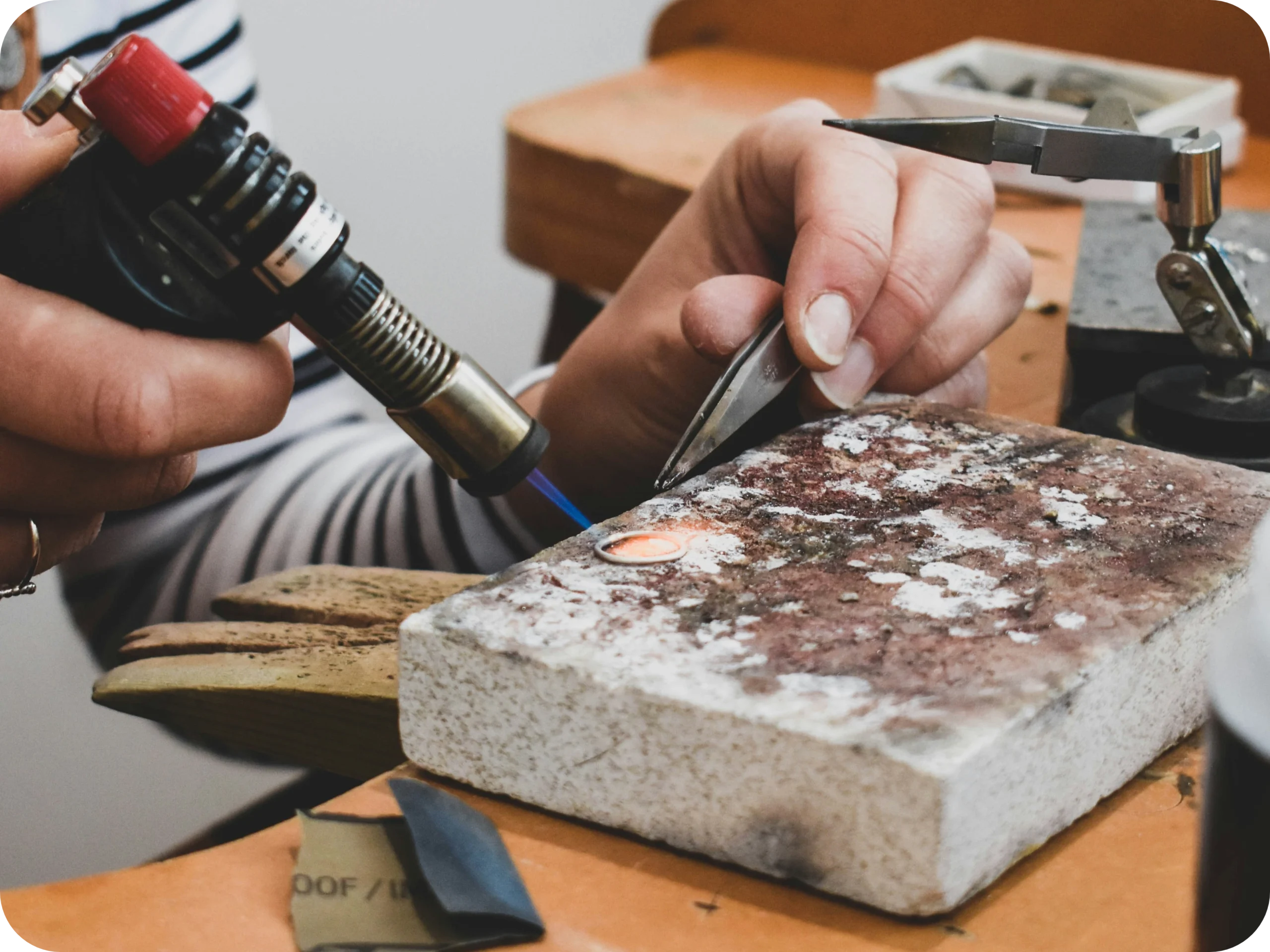
Balinese silver jewelry is world-renowned for its intricate designs and meticulous craftsmanship, rooted in a tradition that traces back to Celuk Village, a region in Gianyar known for its silversmithing. The silver pieces are typically made from 92.5% pure silver (sterling silver) and often feature detailed filigree work, granulation techniques, and traditional motifs inspired by nature, religion, and mythology, such as lotus flowers, dragons, and swirls representing wind and water.
What makes Balinese silver jewelry truly unique is not only the quality of the material but the personal touch of each artisan. Many workshops offer custom-made pieces, allowing you to create a one-of-a-kind keepsake that reflects your journey. You can even watch artisans at work in their studios, which adds to the experience.
To make it extra special, you can also enroll in a 2-hour silver jewelry-making class in Delodsema Traditional Village, a hidden gem located north of Ubud. This village, where silversmithing sustains around 60% of the local economy, offers a hands-on experience where you can craft your own unique piece of jewelry under the guidance of expert silversmiths. The instructors, who come from generations of silversmiths, will walk you through every step—from sketching your design to shaping and finishing. It’s an opportunity to create a meaningful souvenir while learning about the rich cultural heritage of Balinese craftsmanship. Your participation not only results in a personal keepsake but also supports the local community and helps preserve an age-old art vital to Bali’s rural economy and tourism.
Where to Buy:
- Celuk Village: The heart of Bali’s silver industry, where you can watch artisans work and even take a silver-making class.
- Ubud Art Market: A great place to find various designs, though be prepared to haggle for a better price.
- Local Artisan Shops: Small boutiques in Seminyak, Sanur, and Canggu offer contemporary or fusion designs.
Price Range:
- Silver Jewelry in Shops: IDR 100,000 – IDR 5,000,000, depending on the complexity, size, and craftsmanship of the piece.
- Silver Jewelry Making: IDR 300,000–IDR 650,000 for a 2-hour class where you can create your own piece of jewelry under expert guidance.
Tips for Buying:
- Look for the “925” stamp, which indicates sterling silver.
- Ask about the artist and the story behind the design.
- Consider going custom for a truly unique piece.
2. Handwoven (Batik and Ikat) Textiles
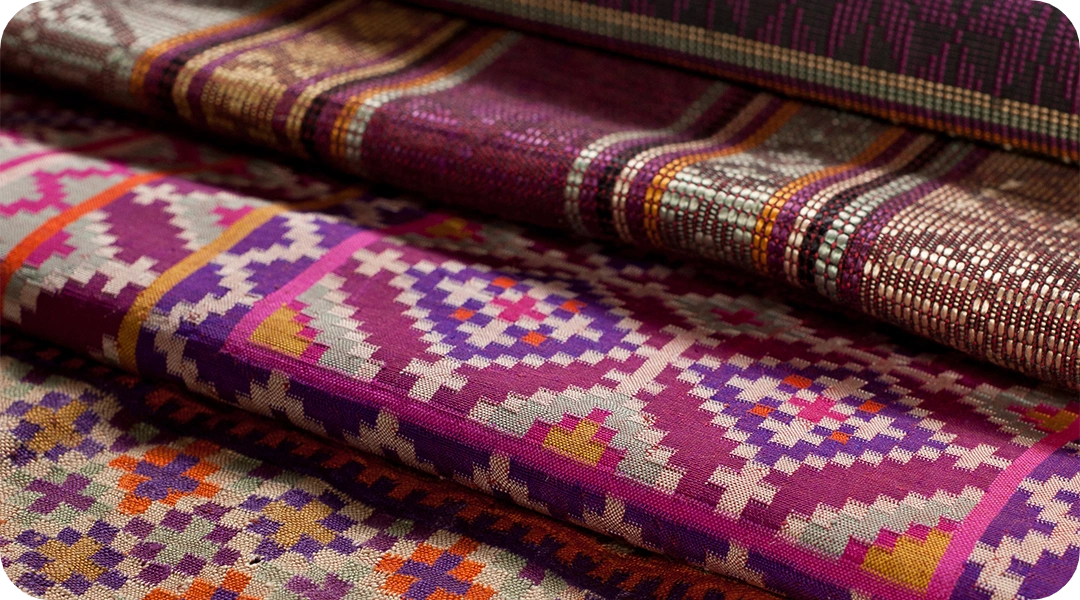
When you think of Bali, the vibrant culture and artistry often come to mind. And what better way to take a piece of that artistry home than with handwoven textiles? Known for their intricate designs and cultural significance, Balinese batik and ikat fabrics are not only beautiful but also carry deep stories that have been passed down through generations. Whether it’s in the form of sarongs, scarves, or tablecloths, these textiles offer a tangible connection to Bali’s rich tradition of craftsmanship.
Batik fabric is made using a wax-resist dyeing technique that creates elaborate, often floral, motifs. The result is a soft, lightweight fabric with rich, detailed designs. On the other hand, ikat fabrics are known for their striking, tie-dye patterns. The weaving process itself creates a unique blurred effect, giving each piece a one-of-a-kind look. Both batik and ikat fabrics are not only eye-catching but also versatile, making them suitable for a variety of uses—from fashion accessories to home decor.
For those interested in the cultural and hands-on aspects, visiting a batik workshop offers a deeper understanding of the work behind these textiles. Watching artisans at work as they carefully apply wax and dye or weave the threads is a fascinating experience that connects you to the roots of this craft.
What to Look For:
- Endek Fabric: Often used in ceremonial attire, Endek is a traditional Balinese fabric known for its distinctive patterns and vibrant colors.
- Batik: Look for pieces with detailed designs, such as floral motifs, animals, or geometric patterns. Authentic batik will have a subtle waxy texture that adds depth to the fabric.
- Songket: A luxurious fabric woven with gold or silver threads, songket is often used for formal or ceremonial occasions and makes for an elegant souvenir.
Where to Buy:
- Threads of Life (Ubud): A shop that specializes in unique textiles, many of which are handwoven by women’s cooperatives from Bali’s remote villages.
- Tohpati Village: Known for its batik workshops and retail stores, Tohpati offers a hands-on experience of watching the batik process while shopping for textiles.
- Markets in Sanur and Seminyak: These bustling markets are filled with a variety of textiles, including sarongs, scarves, and more, all of which make for practical, travel-friendly souvenirs.
Price Range:
- Handwoven Textiles: Expect to pay between IDR 50,000 and IDR 2,000,000 depending on the type of fabric, the complexity of the design, and the vendor. Sarongs and simple scarves from local markets can be found for as low as IDR 50,000, while more intricate batik or ikat pieces can range from IDR 500,000 to IDR 2,000,000.
Additional Tips:
- Look for Quality: Authentic batik and ikat fabrics will feel soft and rich in texture. Be wary of pieces that feel overly stiff or have uneven coloring.
- Packable and Versatile: These textiles are easy to fold, lightweight, and perfect for adding a touch of Bali to your wardrobe or home without taking up too much luggage space.
Own Your Bali Paradise Home With Zero Hassle
From land acquisition to construction and property management, we handle every detail. You simply reap the rewards.
3. Balinese Coffee and Tea

If there’s one souvenir that lets you relive your Bali mornings long after the trip ends, it’s a fresh pack of locally grown coffee or tea. Grown in the fertile volcanic soils of Bali’s highlands, these aromatic brews offer more than just a morning ritual—they reflect the island’s unique landscape and centuries-old cultivation methods. From the bright, citrusy Arabica beans of Kintamani to robust Robusta varieties and spiced blends enhanced with cinnamon, cardamom, or cloves, each sip tells a story of place and process. Herbal teas made from turmeric, lemongrass, ginger, and rosella are also popular, often valued for their natural wellness benefits and earthy flavor profiles.
And of course, you cannot miss Bali’s Kopi Luwak, one of the most exclusive and expensive coffees in the world. Made using beans digested by the Asian palm civet, its smooth, mellow flavor has earned global fame—but it also comes with controversy. So, if you plan to bring it home, be sure to buy only from certified ethical farms that don’t keep the animals in captivity.
Where to Buy:
- Coffee plantations in Ubud and Kintamani, such as Satria Agrowisata and Bali Pulina
- Traditional Markets: Try Pasar Badung in Denpasar or Ubud Market.
- Local Supermarkets: Pepito, Coco Supermarket, and Bali Buda often carry packaged Balinese tea and coffee ideal for gifting.
What to Look For:
- Fresh roast dates and vacuum-sealed packaging to ensure quality
- Ethically sourced or certified Kopi Luwak (avoid tourist traps selling non-authentic blends)
- Herbal teas made with natural ingredients, often labeled with health benefits
Price Range:
- IDR 100,000–300,000 for premium Arabica or Robusta (per 250g)
- IDR 50,000–150,000 for herbal tea blends (per pack)
- IDR 500,000–1,500,000+ for ethically sourced Kopi Luwak (depending on quality and certification)
4. Rattan Bags
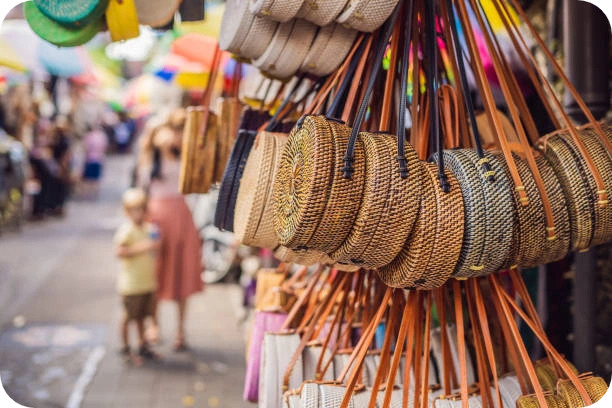
You’ve likely seen rattan bags featured in countless Bali travel photos, and for good reason. In Bali, these bags are a staple in both local markets and everyday island fashion. Crafted from ata grass, a durable vine native to the region, each bag undergoes a meticulous process of hand-weaving, sun-drying, and smoking over coconut husks. This traditional technique is not only a testament to the island’s artisanal skills but also contributes to the bag’s signature scent and sturdy finish.
Aside from handwoven textiles, rattan bags also represent another important expression of Bali’s weaving heritage—one that is deeply rooted in community craftsmanship and passed down through generations. The result is a Balinese style woven bag especially known for its symmetrical, tight weave and intricate detailing, distinguishing it from factory-made alternatives.
It also comes in various shapes and styles, from the iconic round crossbody to rectangular and box forms, often featuring leather straps, batik linings, or delicate embellishments. Each piece is shaped entirely by hand, resulting in one-of-a-kind sustainable accessories that combine function and design. It is also lightweight and breathable yet strong and stylish, making it versatile souvenirs that capture the essence of Bali’s culture and creativity.
Where to Buy:
- Ubud Market: Offers a wide variety of handmade rattan bags in all shapes and sizes, often sold directly by local artisans.
- Seminyak Boutiques: For modern and fashion-forward rattan bags, including designer-inspired pieces.
- Tegalalang Craft Shops: Small artisanal stores selling handmade rattan bags directly from local craftspeople.
- Street Vendors in Canggu: Great for bargaining and finding trendier designs popular with younger tourists.
What to Look For:
- Tight, even weave: Indicates quality craftsmanship and durability.
- Natural smoked scent: Genuine rattan bags are traditionally smoked over coconut husks, which leaves a distinct aroma.
- Sturdy structure: A well-made bag should hold its shape and not feel flimsy or uneven.
- Batik or handwoven linings: Look for inner fabric linings made with traditional Indonesian textiles for added authenticity.
- Hand-finished details: Avoid glued seams or overly uniform stitching, which may suggest mass production.
Price Range:
- Small round bags: IDR 165,000–IDR 415,000
- Medium to large box/rectangular bags: IDR 500,000–IDR 825,000
- Embellished or high-end designs: IDR 825,000–1,325,000
why investors choose
coco development group?

Passive income on full auto pilot
Profit Maximization
We do not just put your property on Airbnb hoping for a guest to book it. More than 40% of our bookings comes today through our own medias, a strong community and a digital and data driven management approach.
A Convenient and fast payment system
The investors receive net profits currency that is convenient for them. we transfer the money once every three months
No need to handle taxes
High Liquidity
Fast Payback
Oceanside villas in Bali are in High demand for daily rentals. You will earn about 5000 USD per month
5. Balinese Wooden Carvings
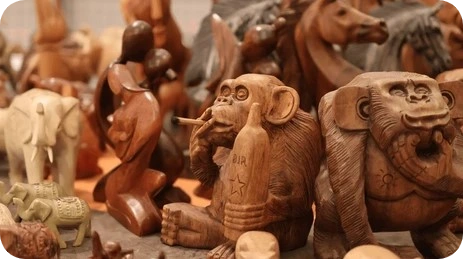
For those drawn to culture-rich decor and handcrafted art with meaning, Balinese wood carvings offer a timeless souvenir that brings depth, beauty, and heritage into any space. Far beyond ornamental pieces, these carvings reflect centuries of craftsmanship deeply rooted in Hindu-Buddhist mythology, village tradition, and spiritual symbolism.
Balinese wood carving is one of the island’s most revered art forms, especially in places like Mas Village near Ubud, where the tradition has been passed down through generations. Here, artisans skillfully transform dense woods such as suar, teak, and ebony into intricate sculptures—from mythical Garuda birds and protective Barong masks to relief panels and ornate furniture. It also comes in a wide variety of styles and sizes, ranging from small figurines perfect for display shelves to large wall panels and freestanding statues, known for their durability and beautiful grain.
So, if you ever decide to bring home one of these heirloom-quality pieces, be sure to ask and learn about its spiritual depth—it adds to its value!
Where to Buy:
- Mas Village (near Ubud): The heart of Balinese wood carving, known for its master craftsmen and family-run workshops where you can observe the carving process.
- Tegallalang Handicraft Center: A stretch of artisan shops selling both traditional and modern designs, often at more accessible prices.
- Ubud Art Market: Offers smaller, travel-friendly wood items such as masks, busts, and statues.
- Specialty Art Galleries (e.g., Adil Art Shop, Njana Tilem Museum): Curated collections of high-end, museum-quality wood carvings with certification of authenticity.
What to Look For:
- Material: High-quality pieces are usually made from suar wood (affordable and versatile), teak (durable and weather-resistant), or ebony (heavy and luxurious).
- Craftsmanship: Inspect the carving’s depth, symmetry, and smooth finish. True Balinese work is detailed and balanced, often featuring layered motifs and storytelling elements.
- Cultural motifs: Look for traditional figures such as Garuda (the national symbol), Barong (protector spirit), or narrative panels from Hindu epics.
- Finish and care: Some pieces are naturally polished, while others are treated with oils or stains. Ask about how to maintain the wood, especially for outdoor display.
Price Range:
- Small carvings (e.g., masks, busts, figurines): IDR 325,000–1,625,000 ($20–100)
- Medium-sized works (e.g., plaques, seated statues): IDR 1,625,000–8,110,000 ($100–500)
- Large or highly intricate pieces (e.g., full panels, life-sized sculptures): IDR 8,110,000–32,000,000 ($500–2000)
6. Natural Spa Products and Essential Oils
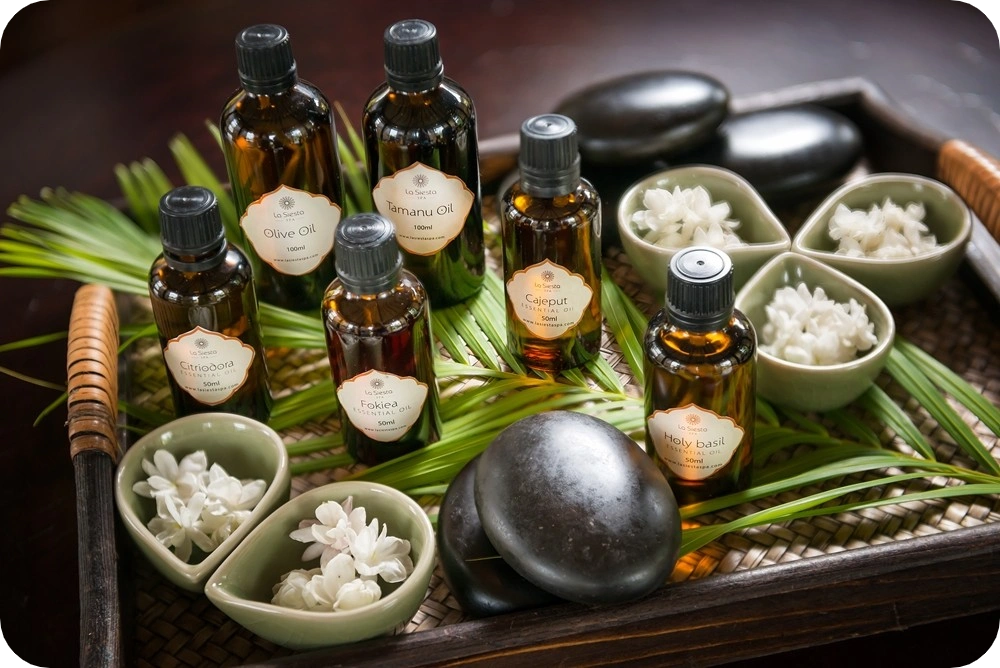
For those who want to take Bali’s wellness spirit home, the island’s natural spa products and essential oils offer a sensory escape rooted in tradition and nature. Drawing on centuries-old herbal knowledge and Bali’s abundance of healing botanicals, these handcrafted products are designed to nourish the body and soothe the mind. From rich coconut oil-based body butters to grounding blends of sandalwood and frangipani, each product surely captures the island’s essence in a bottle or jar.
Many of these items are crafted using locally sourced ingredients and traditional Balinese formulations, making them both effective and environmentally conscious. So whether you’re looking for all-natural massage oils, volcanic clay scrubs, or calming essential oil blends, Bali offers an array of options that make perfect self-care treats or thoughtful gifts.
Must-Buy Products:
- Massage oils made with frangipani, sandalwood, or ginger
- Body scrubs and masks using volcanic clay, sea salt, or coffee grounds
- Essential oils like lemongrass, ylang-ylang, and patchouli
- Hair oils and shampoos made with coconut or aloe vera
Where to Buy:
- Sensatia Botanicals (Ubud, Seminyak, Canggu): Offers eco-certified, chemical-free skincare and wellness products made in Karangasem.
- Utama Spice (Ubud and Online): Known for its 100% natural aromatherapy and skincare goods rooted in traditional Balinese herbalism.
- Local Markets, Pharmacies, and Eco-Stores: Great for budget-friendly options and discovering smaller local brands.
Price Range:
- Essential oils: IDR 80,000–245,000 ($5–15) per bottle depending on purity and brand.
- Body scrubs and masks: IDR 130,000–325,000 ($8–20)
- Gift sets and spa kits: IDR 325,000–800,000 ($20–50)
7. Balinese Masks and Cultural Art
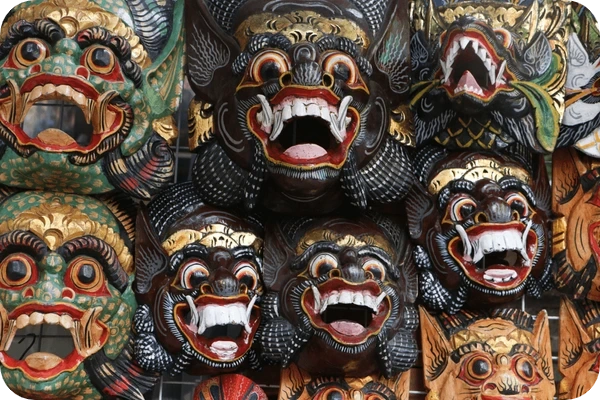
For those fascinated by culture, mythology, and the performing arts but who may find wood carvings or large figurines difficult to take home, Balinese masks offer a more compact yet equally meaningful alternative. Steeped in tradition, these hand-carved masks are used in sacred dance rituals and temple ceremonies across the island. Crafted primarily from wood and elaborately hand-painted, each mask embodies a specific character or spiritual force, making it not only a beautiful decorative piece but also a storytelling artifact.
From the protective Barong and fearsome Rangda to the expressive Topeng characters, Balinese masks reflect centuries of cultural heritage, spiritual symbolism, and artistic mastery. Many are made by artisans in villages like Mas and Batuan, where mask-making is a revered craft passed down through generations. So, whether you choose a small decorative mask or a more elaborate collector’s piece, each one carries with it the essence of Bali’s rich spiritual traditions. And who knows—you might just bring home a little blessing or protection from the spirits that inspired it.
Where to Buy:
- Mas Village: Renowned for its skilled woodcarvers who specialize in traditional ceremonial masks.
- Sukawati Art Market: A budget-friendly spot offering a wide selection of decorative and functional masks.
- Ubud Art Galleries and Batuan Village: Ideal for higher-quality, artist-signed pieces or limited editions.
What to Look For:
- Choose masks made from lightweight, durable woods like pule for authentic ceremonial style.
- Hand-painted finishes with natural pigments or gold accents often indicate higher craftsmanship.
- Ask about the mask’s origin or symbolic meaning—some are intended for sacred use, while others are purely decorative.
Price Range:
- Small decorative masks: IDR 160,000–485,000 ($10–$30)
- Mid-sized or ceremonial-style masks: IDR 810,000–1,625,000 ($50–$100)
- Museum-quality or artist-commissioned pieces: IDR 1,625,000–3,250,000 ($100–$200)
Grow Your Wealth With Quarterly Rental Income
Enjoy consistent, hassle-free earnings. We pay out profits every three months directly to your bank account, in the currency of your choice.
8. Traditional Balinese Snacks and Spices
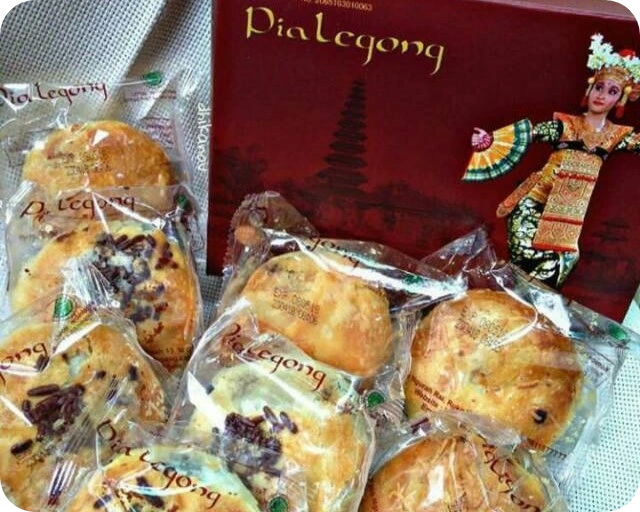
Bali is just as celebrated for its bold flavors and traditional spices as it is for its beaches and temples. So, when someone finds out you’ve been to the Island of the Gods, don’t be surprised if they ask what food souvenirs you brought home. Thankfully, Bali’s markets and specialty stores are brimming with edible treasures—each one promising a flavorful experience that will either leave you sugar-rushed or gasping for air after a bold, spicy food encounter.
Just be mindful of food import restrictions if you’re traveling internationally. Vacuum-sealed and clearly labeled products are your safest bet.
Local Favorites Include:
- Kacang Disco: Spiced peanuts
- Pia Legong: Sweet mung bean pastries, often filled with chocolate, peanut, or durian.
- Salak (snake fruit): A sweet, tangy fruit, often dried for easy transport.
- Bumbu Bali: Spice mixes used for cooking traditional Balinese dishes like satay and nasi goreng.
Where to Buy:
- Krisna Oleh-Oleh: A well-known chain for packaged Balinese snacks and spices.
- Traditional Markets (e.g., Kumbasari Market): Fresh local snacks and homemade goods.
- Airport Duty-Free Shops: Convenient for last-minute purchases, often with quality packaging.
Price Range:
- Kacang Disco (200g pack): IDR 40,500–80,000 ($2.5 – $5)
- Pia Legong (box of 6-10 pieces): IDR 80,000–160,000 ($5 – $10)
- Dried Salak (100g pack): IDR 50,000–100,000 ($3 – $6)
- Bumbu Bali spice mix (100g): IDR 80,000–130,000 ($5 – $8)
9. Balinese Ceramics and Pottery
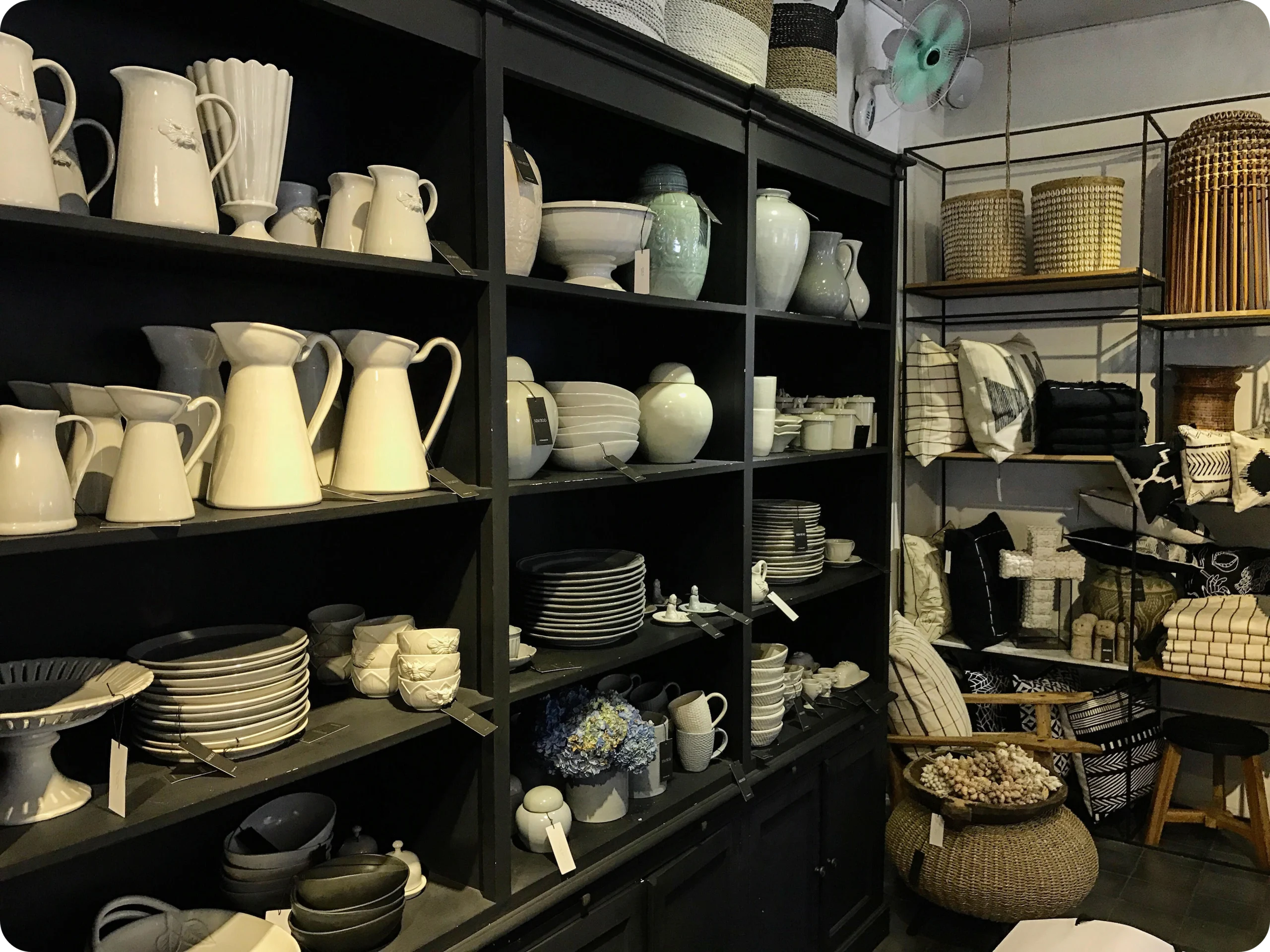
If you’re drawn to stylish, functional table-top decor, a Balinese ceramic piece is a must-have. These handcrafted treasures seamlessly combine traditional craftsmanship with contemporary design, making them the ideal addition to any home. From hand-thrown bowls to intricately etched incense holders, Balinese ceramics are both beautiful and practical, infusing your space with a unique touch of Bali’s artistry.
Popular favorites among travelers include hand-painted plates and bowls adorned with tropical flowers or sacred symbols, ceramic incense holders that add serenity to your home altar, and terracotta statues depicting deities, animals, or rural Balinese life, each piece bringing a bit of Bali’s soul into your everyday life. Definitely, these items will not only elevate your space but also serve as lasting reminders of your time in Bali.
Where to Buy:
- Jenggala Keramik in Jimbaran: Known for its elegant and modern ceramic designs.
- Pejaten Village: Famous for traditional pottery workshops and a wide selection of handcrafted ceramics.
- Local Art Shops in Ubud and Sanur: Selling both everyday ceramic items and more collectible, high-end pieces.
Price Range:
- Small decorative bowls and plates: IDR 160,000–485,000 ($10 – $30)
- Ceramic incense holders: IDR 245,000–650,000 ($15 – $40)
- Large terracotta statues: IDR 800,000–1,600,000 ($50 – $100), with high-quality pieces reaching IDR 2,450,000 ($150) or more.
10. Custom-made Fashion and Beachwear
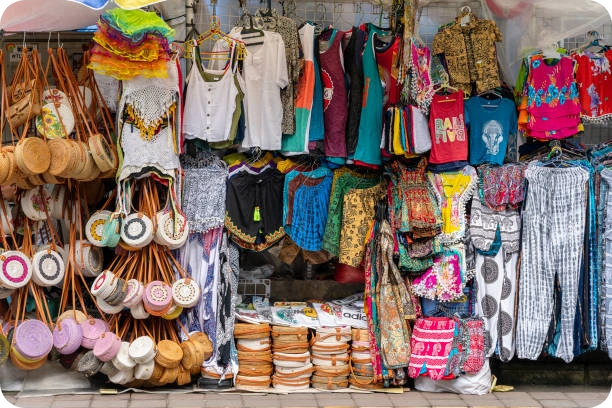
If you’re looking for a unique souvenir that reflects your personal style, Bali’s custom-made fashion and beachwear scene has you covered. Instead of settling for off-the-rack, why not have something tailored just for you? Bali’s skilled tailors can craft everything from stylish linen shirts and flowy dresses to modern takes on traditional garments like the kebaya.
In addition to custom clothing, you’ll find trendy beachwear, including Bintang singlets, handmade flip-flops, and island-chic sundresses. And with the quick turnaround time, you can have your perfect outfit ready before your trip is over, making it an unforgettable piece of your Bali experience. So, whether you’re after resort wear perfect for the tropical climate or a piece incorporating Bali’s signature batik or ikat patterns, you’ll leave with a one-of-a-kind souvenir that fits you perfectly.
Where to Buy:
- Tailor Shops in Seminyak and Kuta: Offer quick and affordable tailoring services for custom clothing.
- Ubud Fashion Boutiques: Perfect for combining modern cuts with traditional fabrics for a stylish, bespoke souvenir.
- Local Textile Markets: Where you can choose your fabric and bring it to a local tailor for a truly one-of-a-kind, customized garment.
Price Range:
- Custom-made resort wear: IDR 325,000–650,000 ($20 – $40)
- Batik shirts or dresses: IDR 480,000–975,000 ($30 – $60)
- Custom swimwear: IDR 405,000–800,000 ($25 – $50)
Construction you can trust
We handle all the details – no hassle for you.

5 Years full warranty

20+ Finished developments in Bali by our team

25+ Years of shared experience
Where to Buy Souvenirs in Bali
Bali offers a wide range of shopping destinations, from bustling markets to curated boutique stores. Whether you’re looking for handmade keepsakes or premium gifts, here are some of the most popular and reliable places to shop:
- Ubud Art Market – Located in the heart of Ubud, this vibrant market is known for handwoven baskets, silk scarves, wood carvings, beaded bags, and traditional paintings. It’s ideal for finding authentic, handmade souvenirs directly from local artisans.
- Sukawati Art Market – One of Bali’s oldest art markets, famous for its wide selection of Balinese handicrafts, masks, statues, and batik fabrics at affordable prices. It’s a great place for bulk buying and practicing your bargaining skills.
- Seminyak Village – A modern and air-conditioned shopping center with upscale boutiques, artisan shops, and souvenir stalls. Perfect if you want quality items like jewelry, clothing, or spa products in a more relaxed setting.
- Krisna Oleh-Oleh – A well-known chain with multiple locations offering fixed-price souvenirs, ideal for travelers who want convenience and variety. Here you’ll find everything from Balinese snacks and kopi luwak to clothes, bags, and trinkets.
- Threads of Life – A fair-trade gallery and shop specializing in high-quality, naturally dyed textiles sourced from indigenous weavers across Indonesia. Buying here directly supports cultural preservation and sustainable livelihoods.
Tip: Always compare prices at a few stalls before purchasing, and don’t be afraid to bargain in traditional markets — it’s expected and part of the cultural shopping experience.
Bali Shopping Guide: Tips for Buying Souvenirs in Bali
Shopping in Bali can be a rewarding experience when you know how to do it right. Here are some practical tips to help you find the best souvenirs while making the most of your budget and time:
- Look for authenticity – Handmade items like silver jewelry often have slight imperfections that show they were crafted by real artisans. These unique touches give your souvenir more character and meaning.
- Pay in cash – Most local vendors don’t accept cards, especially in traditional markets. Carry small bills in Indonesian Rupiah to make transactions easier and improve your chances of bargaining.
- Pack smart – Wrap fragile items in your clothes or bubble wrap to keep them safe during travel. Ask vendors if they offer boxes or padded packaging for delicate purchases.
- Know customs rules – Some countries restrict food, wooden goods, or animal-based products. Check your home country’s regulations before buying to avoid having souvenirs confiscated.
- Shop early in the day – Morning shoppers often get better prices since vendors believe early sales bring good luck. It’s also less crowded and gives you more time to explore.
- Buy for yourself and others – Souvenirs like silver jewelry, handmade crafts, or local spa products make excellent gifts. They’re also perfect reminders of your trip once you’re back home.
- Ask about each item – Vendors often enjoy sharing how a product was made or its cultural significance. Learning these stories adds personal value to what you buy.
- Support local artisans – Visit craft villages like Celuk or traditional markets where goods are made and sold by locals. This supports the community and ensures you’re buying authentic pieces.
Pay 25% of Your Property Straight From Rental Profit
Reduce the financial burden. Use your own villa’s rental income to pay down your investment cost for optimal cash flow and long-term returns.
FAQ
Yes, most countries allow pre-packaged and labeled food items like coffee and spices. However, always check your country’s import rules and avoid fresh or homemade items.
Both types exist. Authentic items usually have slight variations or artisan marks. Shopping at reputable markets or villages like Celuk and Ubud gives you better odds of finding genuine, handmade goods.
For variety and authenticity, Ubud Art Market and Sukawati are top choices. For higher-end or curated options, check out Seminyak boutiques or fair-trade shops like Threads of Life.
Yes, bargaining is expected in local markets. Just keep it friendly and respectful. If a vendor won't budge, try another stall — chances are you'll find something similar elsewhere.
Most non-liquid and non-perishable items are fine in checked luggage. Wrap delicate items well and declare any food products at customs to avoid issues.
Take a Piece of Bali Home!
Bali’s souvenirs are more than just pretty things — they’re living reminders of your journey, the people you met, and the moments that took your breath away. Whether it’s the gleam of handcrafted silver jewelry, the scent of incense at dawn, or the taste of freshly brewed coffee, these items can transport you right back to the island every time you see, wear, or use them.
So don’t settle for generic fridge magnets or plastic trinkets. Explore the markets, talk to the artisans, and invest in souvenirs that are truly meaningful — for yourself and for the people you care about.
After all, the best souvenirs are the ones that tell stories. And Bali has more stories than you could ever fit in a suitcase.

Rasmus Holst is a serial entrepreneur and Co-Founder of COCO Development Group, where he helps drive innovation and growth through strategic business development. He is also the Co-Founder of Estate of Bali and Regnskabshelten.dk, Denmark’s fastest-growing accounting firm, which grew to 35 employees and generated $2.5M in turnover in 2023. Rasmus is passionate about building businesses that create long-term value and impact.














